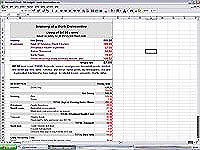
Check the
spreadsheet (pdf) or click on the image to see where the money goes
Here is one reason why DH was glad her contract ended. She worked 4 days (28 hours) per week. (As the parent of a disabled teenager, part-time work was all she could handle.) After D'oH rent, transport, privatised health costs, and fixed costs like gas and electricity, she had only $87 a week left.
Fixed costs btw, do not cover FOOD or any of the items below.
$87 a week had to cover
food, drygoods, clothes, cosmetics, repairs,
emergencies, household goods,
medical and dental gap fees, taxis, holidays, daughter's
university fees, textbooks, stationery and consumables, not to mention female unmentionables, and basic social capital goods, eg newspapers, club and organisation membership fees, outings, accidental losses, presents, charity donations, lattes…
So how does her family survive? Her daughter also gets a disability pension, a princely sum of $160 per week. That's it, $240 per week for everything. She borrows from her mother's age pension at the beginning of the week, and her mother borrows it back at the end.
Why doesn't she work full-time or get a higher paying job? Rent and tax take the bulk of it. Once she earns a certain amount, the percentage that goes on rent also increases. And once she earns over that, she begins to pay HECS, and Austudy, and must pay rent on the gross amount including money she nevers sees. And if she was one of the unfortunates who got their housing after 2005 and was on a fixed tenancy, she would be facing eviction for earning "too much".

